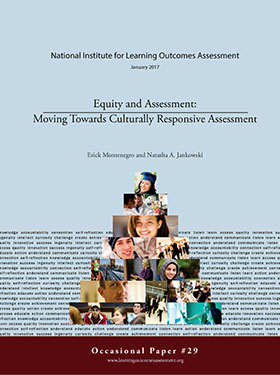This is the first of a series of blog posts on equity in assessment.
Equity affects every aspect of students’ educational pathways -- from instructional strategies and school reforms, to the influence of student demographic characteristics on access, performance, expectations, and the assessment of learning. I was recently invited to provide a response to the National Institute for Learning Outcomes Assessment (NILOA) new Occasional Paper, "Equity and Assessment: Moving Towards Culturally Responsive Assessment." NILOA invites scholars in higher education to respond to the publications and to examine the relevance of their work in light of current educational climates and emerging needs. My response, embedded below, highlights how systemic change is necessary to reach underserved youth and adults throughout P-20 education.
In addition to my response, Thomas F. Nelson Laird and Allison BrckaLorenz, Indiana University Center for Postsecondary Research, provide an insightful written response to the challenges and opportunities associated with equity in assessment. Melissa Wright, University at Buffalo, also provides a written response with meaningful assessment examples from her own institution, Marquette University, and Lesley University to highlight strategies for developing assessments that are more equitable. Finally, Dr. Pamela Petrease Felder, University of Maryland Eastern Shore, offers her response on the importance of culturally responsive assessment. NILOA welcomes and will continue to feature written responses from other prominent scholars discussing equity and assessment.
It is critical that assessments are designed to highlight quality instruction that employs culturally relevant pedagogies that embody the different ways students learn and are attune to the variety of contexts in which learning occurs. Across the educational pipeline, we must be intentional in developing assessments with increasing equity in mind. I encourage you to read "Equity and Assessment: Moving towards Culturally Responsive Assessment" and learn more how NILOA is supporting a movement towards culturally responsive assessment.
